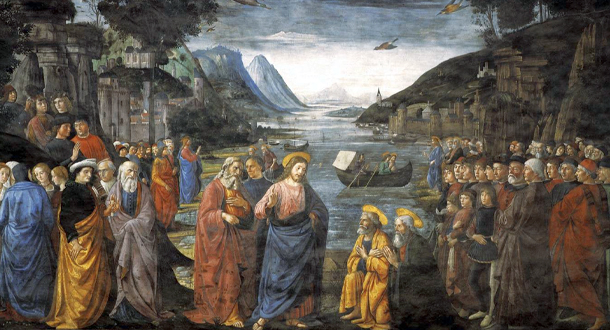
Memorial of St. Peter Claver
Scripture:
Reflection:
The Twelve, Witnesses to Wholeness
We celebrated on Sunday the canonization of Carlo Acutis and Giorgio Frassati, young men noted for their devotion to the Eucharist. Eight years ago, also on the 23rd Sunday of the year, Teresa of Calcutta was canonized. “The saint of the gutters. Dispenser of Divine Mercy for the crimes of Poverty. A light that shines in the darkness for the many who no longer have tears to shed for their poverty and suffering.” In these saints we see together the Sacramental presence of Jesus, and the ‘servant love’ of John’s Last Supper gospel. Two aspects of the Eucharist at times in tension instead of in unison.
In our daily readings have just concluded a section where the beautiful and holy Sabbath become a focus for argument. Jesus defends his disciples who eat grain in the fields on a Sabbath, and then Jesus is challenged about healing on the Sabbath. The beauty of Sabbath, a day of joy and prayer, a day remembering God’s creation and recreation, is lost in the ugliness of such arguments.
During the Babylonian exile the Torah receives a final editing. One editor known as the ‘priestly author’, adds sections of ritual, celebrations of the feasts and common prayer life of Israel. The Sabbath was celebrated from early times among the people of Israel, as a joyful, prayerful day of rest. During the exile a new emphasis appears affirming the identity of Israel in exile as a holy people for a Holy God with their unique rituals. To the Sabbath celebrated in homes or small gatherings during exile rituals were added. The prophet Ezequiel emphasizes the importance of the Sabbath and law, “Even God submitted to the law of the Sabbath”, and Sabbath laws are proclaimed by Nehemiah when the people rededicate themselves to God after their return to Jerusalem. What Israel brought back from Babylon was new to those who did not go into exile. Strangely it was the Pharisees who called for more leniency from the strictest laws. In Jesus life time the Sadducees where strict, the Pharisees less so, although the arguments about the Sabbath in our readings are with the Pharisees.
In the arguments the profound spirituality we hear in a Talmud reflections is lost: ‘On the eve of the Sabbath a special gift is given, it is taken away when Sabbath ends’. The Sabbath is a gift of grace. Or the custom originating in the fifteenth century of processing out of town to greet the arrival of the Sabbath and returning, chanting “Come Bride, Come Bride”. Later a special song develops and continues even into modern times at the singing of the last verse the cantor and congregation stand and turn to face the door to welcome the Royal Bride of the Sabbath, the Beloved of Israel.
In today’s gospel Jesus ends the arguing and selects his 12 apostles. They will replace the twelve tribes of Israel, be witnesses to the resurrection, and the 12 pillars of the New Jerusalem, the Kingdom of God that Jesus proclaims.
We live in a time of tension and division, a fragile holding together more than a time of gathering the richness of harvest. As the Twelve followed Jesus, taking up their crosses we as disciples do the same. May lesser things not distract our hearts, or keep us from from seeing and enjoying the treasures that we possess.
Fr. William Murphy, CP is a member of Immaculate Conception Community in Jamaica, New York.
